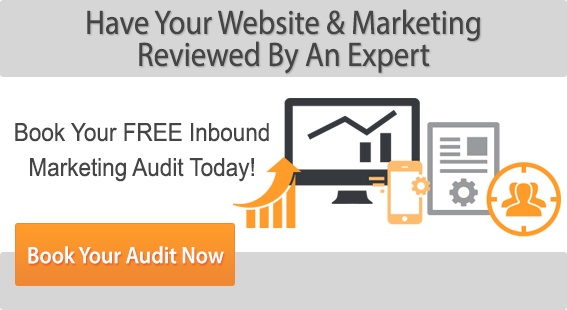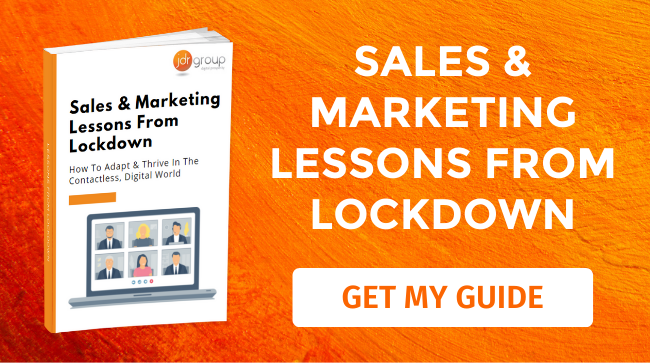What's wrong with your CRM? 4 reasons why your CRM isn't working for your business
by Andy Gibbins on 01-Jun-2022 11:30:00

A good Customer Relationship Management (CRM) software platform is one of the best investments you can make for your business, allowing you to take a systematic approach to sales, marketing, and customer service. However, many businesses find themselves disappointed with their CRM and fail to achieve their expected results and ROI. Why is this? In this article, we explore the main reasons why your CRM isn’t working for your business, and how you can address these problems to improve performance.
Problem #1: You don’t have a strategic vision for your CRM
When something goes wrong the first instinct is often to blame the tools, and in the case of a CRM platform this could well be the case, but often the issues arise from the business not having sufficient strategic vision for how to use their CRM or why it is required.
Unfortunately, the effects of this lack of planning and goal setting are far-reaching. Insufficient strategic planning can result in the wrong choice of software being made, for example, without the right tools and features to achieve your objectives.
There could also be problems and delays during implementation – often due to poor coordination or misunderstandings between teams. It’s difficult to train a team to use a CRM efficiently without a business-level strategy for how to use it, so there’s a high risk of usage errors, leading to your data becoming disorganised, duplicated, or inaccurate. All these factors contribute to poor performance and a low ROI.
Solutions:
- Be clear about what a CRM is intended to do. Many businesses treat a CRM as simply a database or a contact management system, and it is these things but also has wider strategic value. A good CRM will allow you to analyse and manipulate your business data, identifying opportunities, determining trends, and finding out more about the communication patterns and purchasing behaviours of your prospects. Taking full advantage of your CRM’s features will not only give you better control of your marketing, sales, and customer service initiatives, but also enable you to create sales forecasts, plan investments, and make intelligent business decisions.
- Establish a clear vision of what you want to achieve with your CRM, with a set of goals and KPIs.
- Design a checklist of requirements to a ccommodate the needs of the people who use the system. Consulting with your team in advance of purchasing a CRM is essential to ensure full buy-in from your staff.
- Use your organisational goals and end-user requirements to assess each CRM solution for compatibility and request a proof of concept of each platform you shortlist.
Problem #2: You’re using the wrong CRM software for your goals and requirements
The market is crowded with CRM vendors, many with specific areas of application – such as Salesforce, which is highly sales focused, and HubSpot, which is a more all in one system focusing on marketing, sales and service automation. Aligning your choice of CRM with your organisational goals is essential to get the best value from the software. If your business model or goals have changed since you purchased your current CRM, or there were errors during the planning process, your issues could arise from using the wrong type of software for your business.
Signs that this is the case could be that the subscription costs are too expensive for your budget, or that the CRM has too many tools for what you need, potentially causing confusion. It could also be that the CRM doesn’t have the right tools to achieve your goals, leading you to depend on third-party software or spreadsheets to bridge the gap.
Solutions:
- Set a clear budget for CRM implementation and licensing fees that allows you to achieve a realistic and ambitious ROI.
- Review your CRM against your KPIs for the system, assessing each module or feature in terms of how well it helps you achieve these ends.
- If you decide you have the wrong solution in place, weigh up your options. Swapping an established CRM for a new platform is a big undertaking, so assess how much it would cost you to implement a new CRM compared to the costs of adapting your current solution. Working with a specialist in your CRM may help you unlock ‘hidden’ features, or help you operate it in a different way.
Problem #3: It’s the right CRM but it isn’t being used properly
Often there is nothing wrong with the CRM platform itself, simply that the business is underutilising their software, that staff haven’t had sufficient training, or there is insufficient technical support from the vendor.
Solutions:
- Work with your staff to identify individual training needs and look for ways to address any common problems with refresher training. There may be support from the vendor to do this, or you may benefit from working with a UX developer or CRM specialist to create a bespoke training programme around your needs.
- Most good CRM systems have innate flexibility, with a high level of customisation available. Take full advantage of the onboarding support and training provided by your vendor, and beyond this, consider working with a specialist agency to help you unlock the full value of your investment. As HubSpot Certified Diamond Partners, for example, we can often help our customers identify where their CRM is being under-utilised and how to make changes to improve efficiency and productivity.
- Again, the issue of vendor support can often be addressed by implementing a CRM through an agency partner from the beginning. Working with an agency can help you avoid common implementation problems and ensure the right training is in place, and also support you to align the tools and modules of the CRM to your business objectives.
Problem #4: Your data is out of date, inaccurate, or not relevant
A CRM is only as useful as the data stored on it. If your data assets are out of date, inaccurate, or not relevant to your business goals, then the CRM will always fail to live up to its potential. Low quality data may undermine the trust your employees place in the CRM – discouraging full adoption – and could lead to issues with your customers arising from communications made in error. Databases are always prone to lose relevancy over time through entries made in error, duplications, or omissions where people fail to record or update information properly. How do you avoid this?
Solutions:
- Put in place a regular data cleaning strategy in which bouncing emails are removed, and consistently unresponsive prospects are moved to a dormant list or deleted altogether.
- Carry out a periodic review to ensure that all known changes in data – e.g. a company you deal with changes their Operations Director – are implemented efficiently. You may wish to send out an email to your full list occasionally with a gated content incentive for respondents that confirm their details. This is a good way of refreshing your database and implicitly renewing consent at the same time, reminding prospects about your business who may have forgotten about you.
- Use automation – many CRM platforms automatically log customer communications made through different channels, including emails, phone calls, and social media, and import new records entered on contact forms.
Next steps
A CRM is a crucial investment, and it pays to get it right. If you are worried about the performance of your current solution or would like advice choosing a new CRM for your business, please call one of our inbound marketing specialists today on 01332 343281.
Image Source: Unsplash
- Inbound Marketing (SEO, PPC, Social Media, Video) (831)
- Strategy (368)
- Sales & CRM (197)
- Marketing Automation & Email Marketing (190)
- Business Growth (168)
- Website Design (162)
- Hubspot (141)
- Lead Generation (117)
- Google Adwords (100)
- Content Marketing (94)
- Conversion (53)
- Case Studies (49)
- News (47)
- Ecommerce (39)
- Webinars (34)
- SEO (26)
- AI (20)
- Events (19)
- LinkedIn Advertising (17)
- Video (17)
- Video Selling (15)
- Software training (13)
- Niche business marketing (11)
- The Digital Prosperity Podcast (10)
- HubSpot Case Studies (7)
- Facebook Advertising (6)
- Web Design Case Studies (1)
- February 2026 (2)
- January 2026 (12)
- December 2025 (15)
- November 2025 (6)
- October 2025 (17)
- September 2025 (16)
- August 2025 (14)
- July 2025 (14)
- June 2025 (5)
- May 2025 (19)
- April 2025 (15)
- March 2025 (13)
- February 2025 (13)
- January 2025 (8)
- December 2024 (2)
- November 2024 (4)
- October 2024 (21)
- September 2024 (4)
- August 2024 (8)
- July 2024 (14)
- June 2024 (16)
- May 2024 (25)
- April 2024 (15)
- March 2024 (18)
- February 2024 (5)
- January 2024 (10)
- December 2023 (6)
- November 2023 (10)
- October 2023 (13)
- September 2023 (12)
- August 2023 (14)
- July 2023 (13)
- June 2023 (14)
- May 2023 (15)
- April 2023 (13)
- March 2023 (14)
- February 2023 (13)
- January 2023 (15)
- December 2022 (13)
- November 2022 (6)
- October 2022 (8)
- September 2022 (22)
- August 2022 (15)
- July 2022 (13)
- June 2022 (16)
- May 2022 (14)
- April 2022 (16)
- March 2022 (17)
- February 2022 (11)
- January 2022 (8)
- December 2021 (6)
- November 2021 (7)
- October 2021 (11)
- September 2021 (10)
- August 2021 (7)
- July 2021 (7)
- June 2021 (4)
- May 2021 (4)
- April 2021 (1)
- March 2021 (3)
- February 2021 (5)
- January 2021 (4)
- December 2020 (7)
- November 2020 (6)
- October 2020 (5)
- September 2020 (9)
- August 2020 (18)
- July 2020 (17)
- June 2020 (17)
- May 2020 (10)
- April 2020 (21)
- March 2020 (24)
- February 2020 (21)
- January 2020 (12)
- December 2019 (23)
- November 2019 (12)
- October 2019 (14)
- September 2019 (16)
- August 2019 (15)
- July 2019 (13)
- June 2019 (6)
- May 2019 (8)
- April 2019 (4)
- March 2019 (2)
- February 2019 (2)
- January 2019 (2)
- December 2018 (3)
- November 2018 (24)
- September 2018 (11)
- August 2018 (9)
- June 2018 (3)
- May 2018 (6)
- April 2018 (14)
- March 2018 (12)
- February 2018 (16)
- January 2018 (15)
- December 2017 (15)
- November 2017 (18)
- October 2017 (23)
- September 2017 (19)
- August 2017 (28)
- July 2017 (27)
- June 2017 (25)
- May 2017 (18)
- April 2017 (17)
- March 2017 (16)
- February 2017 (17)
- January 2017 (14)
- December 2016 (21)
- November 2016 (27)
- October 2016 (25)
- September 2016 (16)
- August 2016 (20)
- July 2016 (19)
- June 2016 (14)
- May 2016 (20)
- April 2016 (24)
- March 2016 (22)
- February 2016 (28)
- January 2016 (27)
- December 2015 (28)
- November 2015 (19)
- October 2015 (9)
- September 2015 (12)
- August 2015 (5)
- July 2015 (1)
- June 2015 (10)
- May 2015 (3)
- April 2015 (11)
- March 2015 (14)
- February 2015 (15)
- January 2015 (12)
- December 2014 (2)
- November 2014 (23)
- October 2014 (2)
- September 2014 (2)
- August 2014 (2)
- July 2014 (2)
- June 2014 (7)
- May 2014 (14)
- April 2014 (14)
- March 2014 (7)
- February 2014 (2)
- January 2014 (7)
- December 2013 (9)
- November 2013 (14)
- October 2013 (17)
- September 2013 (3)
- August 2013 (6)
- July 2013 (8)
- June 2013 (4)
- May 2013 (3)
- April 2013 (6)
- March 2013 (6)
- February 2013 (7)
- January 2013 (5)
- December 2012 (3)
- November 2012 (2)
- September 2012 (1)
Subscribe by email
You May Also Like
These Related Blogs

Video: 3 Ways JDR Group Can Help You Grow Your Business

3 Reasons Why Your Business Should Implement Inbound Marketing
Inbound marketing is a completely different outlook on not just your marketing, but your entire business. Adopting this strategy involves a change in …

Inbound Marketing – Who's on your team in 2015?
To start off 2015 you and your business has decided to establish inbound marketing techniques in the business. The great news is that Inbound marketin …




